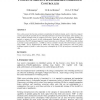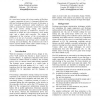205 search results - page 2 / 41 » Clock gating architectures for FPGA power reduction |
HPCA
2003
IEEE
14 years 5 months ago
2003
IEEE
With the scaling of technology and the need for higher performance and more functionality, power dissipation is becoming a major bottleneck for microprocessor designs. Pipeline ba...
CORR
2010
Springer
13 years 5 months ago
2010
Springer
Now a days, power has become a primary consideration in hardware design, and is critical in computer systems especially for portable devices with high performance and more functio...
ITC
2003
IEEE
13 years 10 months ago
2003
IEEE
In a scan-based system with a large number of flip-flops, a major component of power is consumed during scanshift and clocking operation in test mode. In this paper, a novel scan-...
ICCAD
2004
IEEE
14 years 2 months ago
2004
IEEE
Power is an increasingly important design constraint for FPGAs in nanometer technologies. Because interconnect power is dominant in FPGAs, we design Vdd-programmable interconnect ...
PATMOS
2005
Springer
13 years 10 months ago
2005
Springer
In this paper, we present a low power high temperature 80C51 microcontroller. The low power optimizations are applied at gate and architectural level, by using extensive clock and ...


